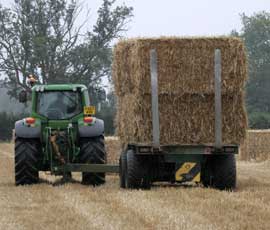VIDEO: Straw war over £100m biomass power station

The company behind a controversial straw-burning power station is considering an appeal after planning permission was refused for the venture.
Mid-Suffolk District Council rejected the Eco2 application for a £100m biomass burner located on agricultural land near the village of Mendlesham, north of Ipswich.
Eco2 claims the 40-megawatt plant would generate 300m units of electricity and save about 150,000t of carbon dioxide emissions every year.
The renewable energy plant would burn about 240,000t of straw annually. But the idea of burning straw has divided the local community – including farmers.
While a straw-fuelled plant would be a potentially lucrative outlet for cereal growers, pig producers who rely on straw for bedding fear it will force up prices beyond their reach.
If the project is successful, Eco2 says it would create 30 jobs in the direct operation and maintenance of the plant and the equivalent of 50 full-time jobs in the supply of straw.
Local residents opposed to the power station have formed an action group.
Mid-Suffolk’s planning committee refused to grant planning permission for the Mendlesham biomass burner last Wednesday (17 July).
Dan Poulter, MP for Central Suffolk and North Ipswich, has voiced his support for the decision, saying the plant would have a detrimental effect on straw prices.
But Eco2 project director Andrew Toft said the company was confident that the venture would gain planning permission at appeal.
“The reasons for refusal cannot be sustained at appeal and we will have to consider that route – regretting of course the significant additional cost to the council’s taxpayers,” he said.
The decision raised issues beyond the planning process, added Mr Toft.
Councillors risked turning their backs on massive inward investment, jobs, revenue and the opportunity to diversify the region’s economy, he said.
“A robust economy is not static – markets must grow, adapt and innovate. This decision does nothing to preserve or enhance the economy. It risks doing quite the opposite.”
Eco2 claims six full-time roles would be created in managing fuel logistics and monitoring plant performance, with more jobs secured in the supply of other goods and services.
Mr Toft said he estimated there would be a total inward investment of about £120m after additional infrastructure costs, such as grid connection, were taken into account.
He also hit out at claims that the plant would unfairly affect the local straw market.
“It is of course too late, but [councillors] have failed to appreciate a point that we have made repeatedly: we cannot build this plant if it interferes with the existing straw market. Nobody would fund the project on this basis.”
Doubts have, however, been raised over whether there is enough straw for East Anglia’s burgeoning biomass sector – although Mendlesham has been seen as a favourable site.
A separate straw-fuelled power station is due to come on stream this autumn at Sleaford, Lincolnshire. A similar plant is planned for Snetterton, Norfolk.
Taken together, the three plants would burn about 750,000t of straw annually.
Much of the region’s straw for livestock producers, growers and the renewable energy sector is sourced by AF Biomass, a subsidiary of farmer-owned cooperative Anglia Farmers.
Earlier this year, AF Biomass wrote to Mid-Suffolk council saying it felt there was only enough straw locally to supply one of the additional plants – at either Snetterton or Mendlesham.
“Only one of these plants will be able to be fuelled on 100% wheat straw in the current normal harvest year without reducing the straw availability for livestock producers,” said the letter.
The Mendlesham project was better located in terms of the local straw supply, but it should be possible for both plants to be accommodated if another fuel such as wood was used.
“There is a finite resource of straw and a balance is required to prevent shortages within East Anglia for the livestock sector,” said the AF Biomass letter.
“It would be counter-productive to force up the price of straw to uneconomic levels – for both farmers and the power stations themselves.”
